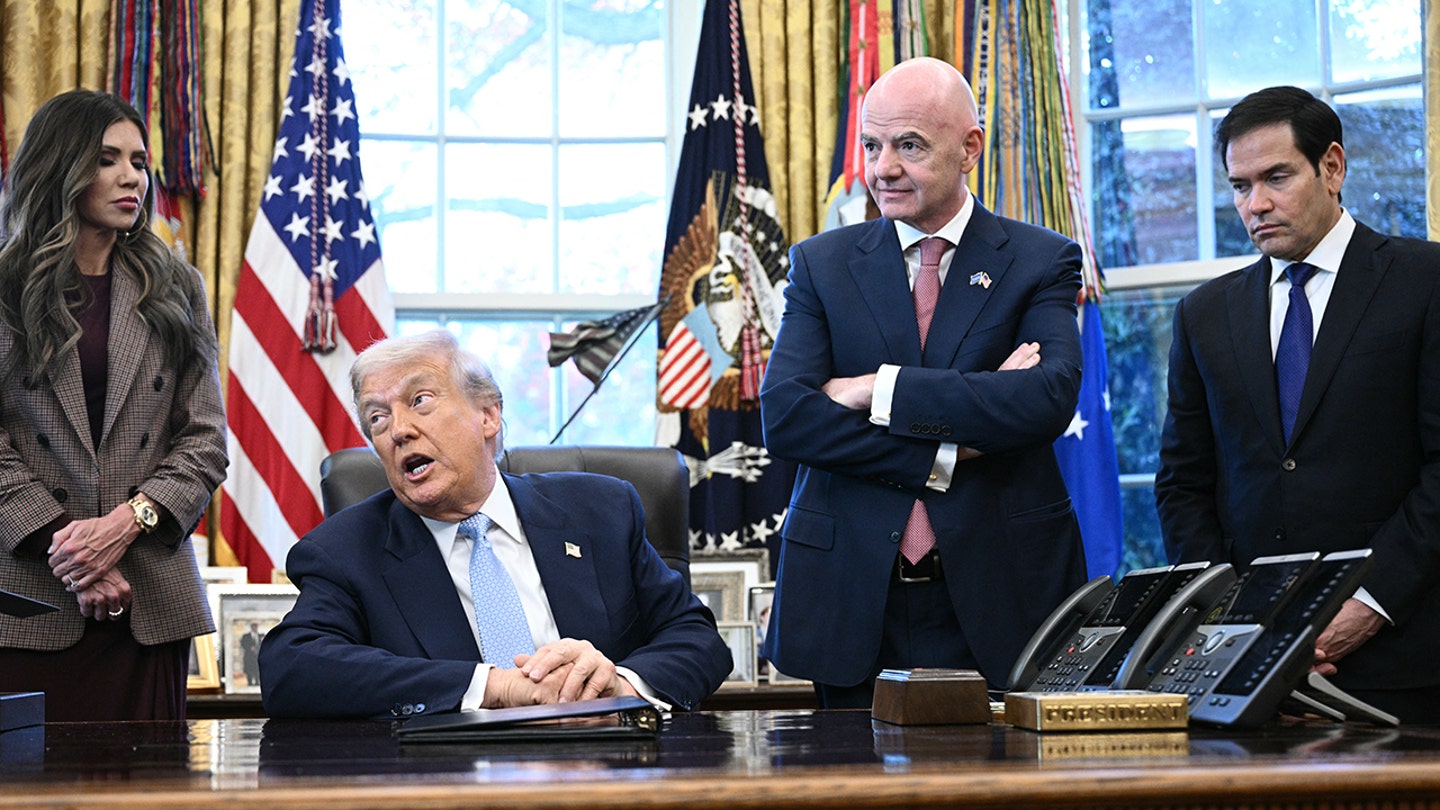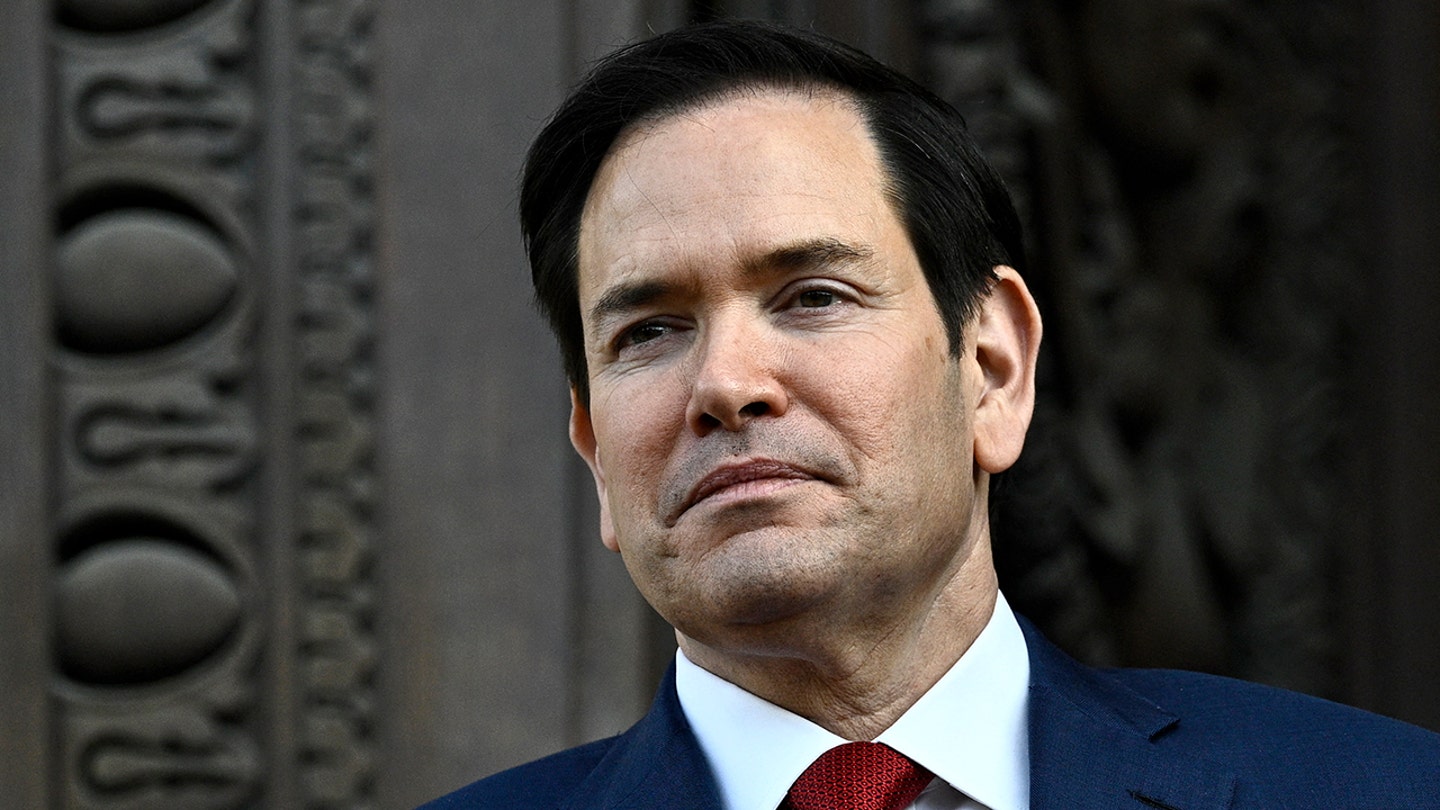
US prepares for influx of international visitors ahead of World Cup with security at the forefront
Entities mentioned:
- United States: Pride, Security, Recognition
- President Donald Trump: Ambition, Legacy, Control
- State Department: Duty, Security, Professional pride
- Matt Pierce: Professional pride, Duty, Enthusiasm
- Marco Rubio: Duty, Professional pride, Security
- FIFA: Ambition, Recognition, Legacy
Article Assessment:
Credibility Score: 75/100
Bias Rating: 65/100 (Lean Right)
Sentiment Score: 75/100
Authoritarianism Risk: 55/100 (Mixed/Neutral)
Bias Analysis:
The article leans right, focusing heavily on Trump administration initiatives and quoting only Republican officials. It presents a positive view of increased security measures without exploring potential downsides.
Key metric: International Tourism Revenue
Let me tell you something, folks - this is the ULTIMATE PREGAME SHOW for Team USA! The 2026 World Cup is like our country's Super Bowl, and President Trump is playing 4D chess to make sure we DOMINATE on and off the field. We're talking about a FULL COURT PRESS on security and hospitality! The State Department is running a FULL-THROTTLE OFFENSE with this 'FIFA Pass' play, aiming to CRUSH those visa wait times like a linebacker demolishing a quarterback. But make no mistake, they're playing LOCKDOWN DEFENSE too, vetting visitors with the intensity of a championship team studying game film. This is America's chance to flex its HOSTING MUSCLES and show the world we've got the STAMINA, the STRATEGY, and the STAR POWER to put on the greatest show on earth! I'm telling you right now, this is going to be a SLAM DUNK for U.S. tourism and our global reputation. It's GAME TIME, America!

House Democrats call on Rubio to allow injured children from Gaza into US following visa halt
Entities mentioned:
- House Democrats: Moral outrage, Justice, Compassion
- Trump administration: Security, Control, Wariness
- Marco Rubio: Security, Duty, Wariness
- State Department: Security, Control, Duty
- Hamas: Power, Control, Influence
- Israeli government: Security, Control, Self-preservation
Article Assessment:
Credibility Score: 75/100
Bias Rating: 40/100 (Lean Left)
Sentiment Score: 35/100
Authoritarianism Risk: 45/100 (Mixed/Neutral)
Bias Analysis:
The article leans slightly left, giving more space to Democratic concerns and humanitarian arguments. While it includes Rubio's perspective, it frames the visa halt more critically and emphasizes the potential negative impact on children needing medical care.
Key metric: US Foreign Policy Effectiveness
As a social scientist, I analyze that this article highlights a conflict between humanitarian concerns and national security interests in US foreign policy. The decision to halt visas for Gaza residents, including children needing medical care, demonstrates a prioritization of security concerns over humanitarian aid. This policy shift could impact the US's global image and its ability to balance hard and soft power in international relations. The congressional pushback indicates internal disagreement on the appropriate balance between security and humanitarian considerations, which could lead to policy adjustments. The situation also underscores the complex interplay between domestic politics, international relations, and humanitarian issues in US foreign policy decision-making.

Trump asks Supreme Court to step in and block billions in foreign aid spending
Entities mentioned:
- Trump administration: Control, Power, Influence
- Supreme Court: Justice, Duty, Influence
- Department of Justice: Duty, Loyalty, Control
- US Court of Appeals for the DC Circuit: Justice, Duty, Influence
- Congress: Power, Control, Duty
- State Department: Duty, Influence, Control
- USAID: Duty, Influence, Unity
Article Assessment:
Credibility Score: 75/100
Bias Rating: 55/100 (Center)
Sentiment Score: 40/100
Authoritarianism Risk: 35/100 (Generally Democratic)
Bias Analysis:
The article presents a balanced view of the legal dispute, including perspectives from both the Trump administration and the lower courts. While it quotes more extensively from the administration's filing, it also provides context about previous court decisions and the ongoing nature of the dispute.
Key metric: US Foreign Aid Spending
As a social scientist, I analyze that this article highlights a complex legal battle between the executive and legislative branches over control of foreign aid spending. The Trump administration's attempt to block billions in foreign aid reflects a shift in US foreign policy priorities and could significantly impact America's global influence and diplomatic relationships. The case raises questions about the balance of power between different branches of government and the role of the judiciary in settling such disputes. The potential rapid obligation of $12 billion in foreign aid funds, if the Supreme Court doesn't intervene, could have far-reaching consequences for US foreign policy implementation and international commitments.

US suspends visitor visas for people from Gaza
Entities mentioned:
- Marco Rubio: Security, Duty, Control
- State Department: Security, Control, Duty
- Hamas: Power, Control, Influence
- Trump administration: Security, Control, Power
- Laura Loomer: Moral outrage, Influence, Fear
- HEAL Palestine: Duty, Compassion, Justice
- Donald Trump: Power, Influence, Recognition
- Benjamin Netanyahu: Power, Control, Security
Article Assessment:
Credibility Score: 65/100
Bias Rating: 55/100 (Center)
Sentiment Score: 30/100
Authoritarianism Risk: 65/100 (Authoritarian Tendencies)
Bias Analysis:
The article presents multiple viewpoints, including government officials and humanitarian organizations. However, it gives more space to the administration's perspective, while critiques are less elaborated.
Key metric: Immigration and Border Control Effectiveness
As a social scientist, I analyze that this policy change reflects a significant shift in the US approach to humanitarian visas for Palestinians, particularly those from Gaza. The suspension of visitor visas, justified by alleged links to terrorist groups, indicates a prioritization of national security concerns over humanitarian considerations. This decision may have far-reaching implications for US-Palestine relations, humanitarian aid efforts, and the perception of the US in the international community. The involvement of far-right figures like Laura Loomer suggests potential political motivations beyond stated security concerns. The contrast between Trump's acknowledgment of the humanitarian crisis and this policy decision highlights the complex interplay between foreign policy, domestic politics, and humanitarian obligations. This move could potentially exacerbate the humanitarian situation in Gaza while altering the US's role in providing medical aid to conflict-affected populations.
- Read more about US suspends visitor visas for people from Gaza
- Log in to post comments

US State Department has revoked more than 6,000 student visas, official says
Entities mentioned:
- State Department: Security, Control, Duty
- Trump administration: Security, Control, Nationalism
- Rumeysa Ozturk: Freedom, Justice, Self-preservation
- Marco Rubio: Loyalty, Security, Righteousness
- NAFSA: Association of International Educators: Professional pride, Concern, Influence
Article Assessment:
Credibility Score: 75/100
Bias Rating: 55/100 (Center)
Sentiment Score: 30/100
Authoritarianism Risk: 65/100 (Authoritarian Tendencies)
Bias Analysis:
The article presents multiple perspectives, including government officials and educational organizations. While it leans slightly towards criticizing the policy, it also provides space for the administration's justifications.
Key metric: International Student Enrollment
As a social scientist, I analyze that the revocation of over 6,000 student visas by the US State Department represents a significant shift in immigration policy with potential far-reaching consequences. This action, part of a broader crackdown on international students, is likely to impact the United States' position as a global leader in higher education. The justifications provided for these revocations, ranging from expired visas to allegations of terrorism support, suggest a tightening of national security measures. However, the broad scope and aggressive implementation of these policies may lead to unintended consequences, including a substantial decline in international student enrollment and subsequent economic losses. The new vetting requirements, including scrutiny of social media profiles, raise concerns about privacy and potential ideological screening. This shift could potentially damage the US's soft power and cultural influence globally, as well as its ability to attract top international talent. The projected 30-40% decline in new international student enrollment could have significant economic impacts, affecting not only universities but also local economies that benefit from international students' presence.

State Department stops issuing all visitor visas for individuals from Gaza
Entities mentioned:
- State Department: Security, Control, Duty
- Marco Rubio: Security, Righteousness, Duty
- Hamas: Power, Control, Revenge
- Trump administration: Security, Control, Nationalism
- France: Security, Justice, Self-preservation
- Jean-Noël Barrot: Security, Justice, Duty
- Nour Attaalah: Self-preservation, Fear, Loyalty
- Palestinian Central Bureau of Statistics: Professional pride, Duty, Recognition
Article Assessment:
Credibility Score: 75/100
Bias Rating: 55/100 (Center)
Sentiment Score: 30/100
Authoritarianism Risk: 55/100 (Mixed/Neutral)
Bias Analysis:
The article presents a relatively balanced view, including perspectives from multiple sources and countries. However, there's a slight lean towards emphasizing security concerns over humanitarian aspects, which could be interpreted as a centrist to slightly right-leaning position.
Key metric: Immigration and Border Security
As a social scientist, I analyze that this article highlights a significant shift in U.S. immigration policy towards individuals from Gaza, reflecting heightened security concerns and stricter vetting processes. The sudden halt in visitor visas suggests a reactive measure to potential security threats, possibly linked to the ongoing Israel-Hamas conflict. This policy change aligns with a broader trend of increased scrutiny in visa issuance, as evidenced by the Trump administration's prior actions and similar measures taken by other countries like France. The impact on the Immigration and Border Security metric is substantial, as it demonstrates a tightening of borders and more stringent control over who enters the country, particularly from conflict-prone regions. This could lead to reduced immigration numbers from certain areas and potentially affect diplomatic relations. The article also touches on the broader humanitarian implications of the ongoing conflict, as indicated by the population decline in Gaza, which adds complexity to the immigration issue.

Appeals court allows Trump to continue ending foreign aid grants
Entities mentioned:
- President Donald Trump: Power, Control, Influence
- US DC Circuit Court of Appeals: Duty, Justice, Obligation
- Congress: Power, Control, Obligation
- State Department: Duty, Obligation, Influence
- USAID: Duty, Obligation, Professional pride
- Judge Karen Henderson: Duty, Justice, Professional pride
- Lauren Bateman: Justice, Moral outrage, Duty
- Judge Greg Katsas: Duty, Loyalty, Professional pride
- Judge Florence Pan: Justice, Moral outrage, Duty
- Steve Vladeck: Justice, Professional pride, Moral outrage
Article Assessment:
Credibility Score: 75/100
Bias Rating: 55/100 (Center)
Sentiment Score: 35/100
Authoritarianism Risk: 65/100 (Authoritarian Tendencies)
Bias Analysis:
The article presents multiple viewpoints, including the court's decision, dissenting opinion, and expert commentary. While it leans slightly towards criticism of the ruling, it provides factual information about the decision and its potential impacts.
Key metric: Separation of Powers Index
As a social scientist, I analyze that this court ruling significantly impacts the balance of power between the executive and legislative branches of the US government. By limiting the ability to challenge presidential budget decisions to only the Comptroller General, the court has potentially increased executive power at the expense of legislative oversight. This could lead to a shift in the Separation of Powers Index, potentially weakening checks and balances. The decision may also have far-reaching consequences for foreign aid distribution, potentially affecting US soft power and global health initiatives. The dissenting opinion and expert commentary suggest that this ruling could be seen as a departure from established constitutional norms, which may lead to further legal challenges or attempts to address this through legislation.

Feds unseal charges against 'Barbecue,' Haitian gang leader with $5M bounty on his head
Entities mentioned:
- Jimmy 'Barbecue' Chérizier: Power, Control, Influence
- Bazile Richardson: Loyalty, Greed, Self-preservation
- Jeanine Pirro: Justice, Duty, Professional pride
- Department of Justice: Justice, Security, Control
- U.S. Government: Security, Justice, Control
- State Department: Security, Justice, Influence
Article Assessment:
Credibility Score: 75/100
Bias Rating: 55/100 (Center)
Sentiment Score: 35/100
Authoritarianism Risk: 30/100 (Generally Democratic)
Bias Analysis:
The article presents information from official U.S. government sources, which gives it a slightly center-right lean. However, it maintains a relatively balanced tone, focusing on factual information about the indictments and rewards without overt political commentary.
Key metric: International Security Cooperation
As a social scientist, I analyze that this article highlights the U.S. government's efforts to combat transnational organized crime and human rights abuses through legal and financial means. The indictment of Chérizier and Richardson demonstrates a commitment to enforcing international sanctions and prosecuting those who violate them. This action likely strengthens U.S. credibility in international security cooperation, potentially encouraging other nations to align with U.S. efforts in combating global criminal networks. The $5 million reward offer further emphasizes the seriousness of the charges and the U.S.'s determination to bring Chérizier to justice. This case may serve as a deterrent to others considering supporting sanctioned individuals or organizations, thereby potentially improving the effectiveness of international sanctions as a tool for addressing human rights abuses and organized crime.

Stanford’s student newspaper sues Trump administration over use of immigration law to target pro-Palestinian students
Entities mentioned:
- Stanford University's student-run newspaper: Justice, Freedom, Self-preservation
- Trump administration: Control, Security, Power
- State Department: Security, Control, Duty
- Homeland Security Department: Security, Control, Duty
- Foundation for Individual Rights and Expression: Justice, Freedom, Righteousness
- Marco Rubio: Power, Security, Duty
- Judge William Young: Justice, Duty, Impartiality
Article Assessment:
Credibility Score: 75/100
Bias Rating: 45/100 (Center)
Sentiment Score: 35/100
Authoritarianism Risk: 65/100 (Authoritarian Tendencies)
Bias Analysis:
The article presents multiple perspectives, including those of the plaintiffs and the government. While it appears to sympathize with the students' position, it also explains the government's rationale, maintaining a relatively balanced approach.
Key metric: Civil Liberties Index
As a social scientist, I analyze that this article highlights a significant conflict between national security interests and First Amendment rights, particularly affecting non-citizen students and academics. The lawsuit challenges the Trump administration's use of immigration law to potentially suppress pro-Palestinian speech, which could have a chilling effect on free expression in academic settings. This case exemplifies the tension between government efforts to control political narratives and the constitutional protection of free speech, even for non-citizens. The outcome of this and similar lawsuits could have far-reaching implications for the balance between national security measures and civil liberties in the United States, potentially impacting the country's Civil Liberties Index.

State Department may require visa applicants to post bond of up to $15,000 to enter the US
Entities mentioned:
- State Department: Control, Security, Duty
- Trump administration: Control, Security, Influence
- Visa applicants: Freedom, Ambition, Self-preservation
- U.S. government: Security, Control, Self-preservation
Article Assessment:
Credibility Score: 75/100
Bias Rating: 55/100 (Center)
Sentiment Score: 35/100
Bias Analysis:
The article presents a relatively balanced view of the proposed policy, including both the government's rationale and potential concerns. While it mentions the Trump administration's role, it doesn't editorialize on the policy's merits, maintaining a largely neutral stance.
Key metric: Net International Migration
As a social scientist, I analyze that this proposed policy could significantly impact the Net International Migration metric for the United States. The implementation of visa bonds up to $15,000 for certain countries may act as a deterrent for potential visitors, especially those from lower-income nations. This could lead to a decrease in both short-term visitors and potential long-term immigrants, as the financial barrier may discourage applications. Additionally, the policy may disproportionately affect business travelers and tourists from developing countries, potentially impacting economic and cultural exchanges. The pilot program's selective application based on overstay rates and document security could also lead to diplomatic tensions with affected countries, possibly resulting in reciprocal measures against U.S. travelers.